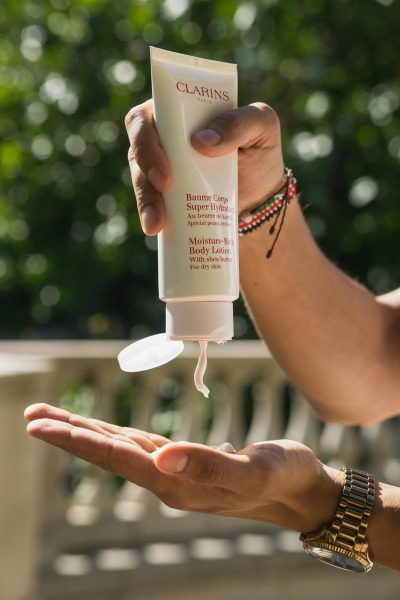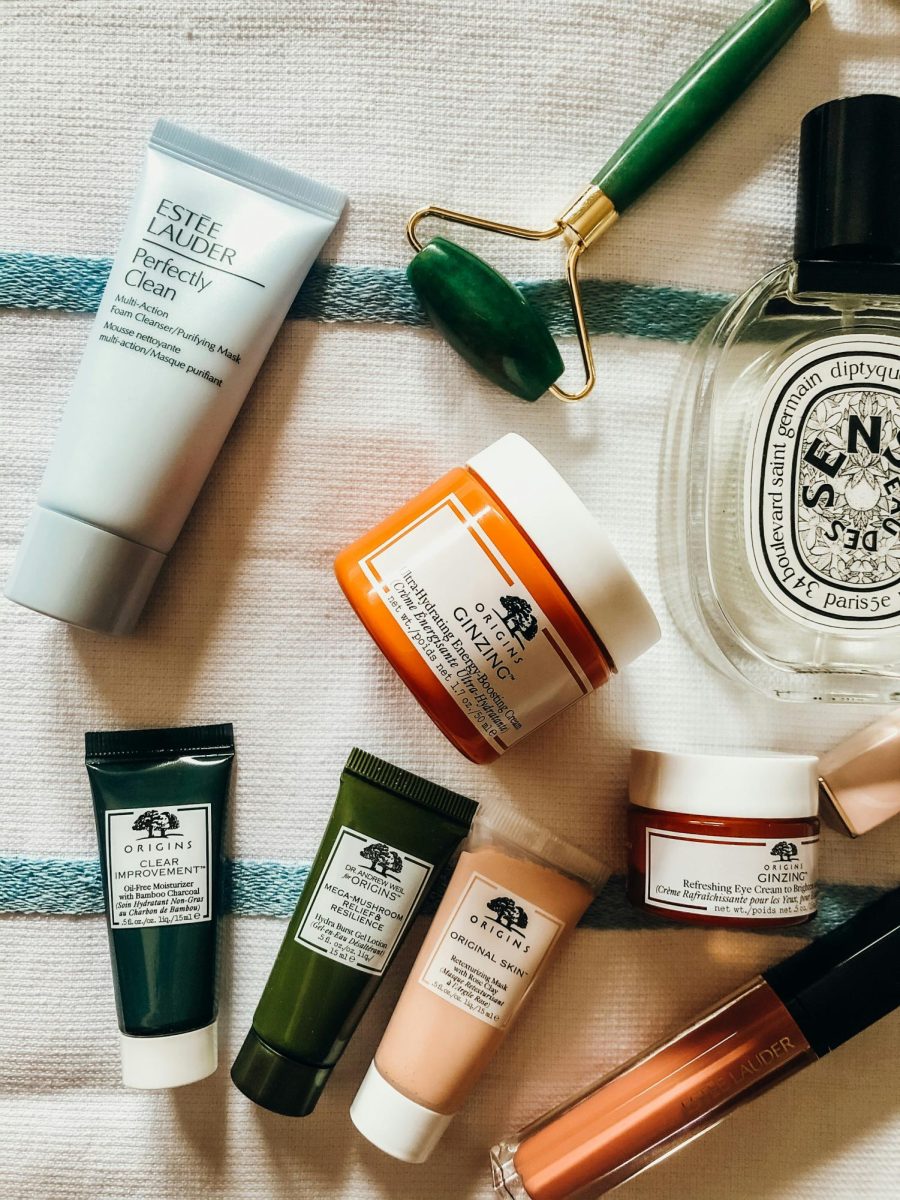As I approach the skincare aisle at my local CVS, a kaleidoscope of bottles, tubes, and serums await me. Each promises a miracle, yet their labels read a foreign dictionary of chemistry terms. “Hexapeptide-9,” “Ascorbyl Tetraisopalmitate,” “Biocellulose” – these are just some of the ingredients that perplex my mind and twist my speech. Still, with a shrug and a silent concession, I let it tumble into my basket. After all, if it came stamped with a “dermatologist-tested” label or trended on TikTok as a product you should “Run, don’t walk” for, why wouldn’t it be good, right?
It’s no question our skincare industry has transformed tremendously throughout the millenniums. From the beginning of Egyptian ritual creams and baths to now a global skincare market, we carry a bewildering array of products for every skin type and concern. Thanks to our incredibly advanced technology and dermatologists, the skincare market is expected to have a global growth of $109.71 billion to $167.22 billion by 2030. And with every year, the shelves refill with new brands and creations, each claiming to be the elixir of youth, the remedy for wrinkles, or the product that will solve your issue in just two weeks. But this abundance doesn’t need to be so complicated.
Our Fake Reality
In the pursuit for flawless skin, consumers are bombarded with thousands of advertisements and messages, each more creatively persuasive and compelling than the last. You see it on the streets, on your phone, and hear it from your friends. “Baby smooth skin for an affordable price!” “One step to FLAWLESS skin.” “Be natural, Be You!” However, you would be shocked to learn there exists numerous toxic chemicals in your daily skincare products, none of which are natural. That’s where marketers come in.
Marketers create an innovative drive to illustrate the need and urge for you to upgrade your skincare drawer. They project a message that the secret to plump skin and true beauty lies within their product. How so? Many brands boldly highlight their use of a unique ingredient that’s proven to have a multitude of benefits or that their products have some of the best doctors curating them. However, even a statement as compelling as that is something you truly don’t need.
In our digital age, social media is the center of influencer marketing. Apps like Instagram, TikTok, and Youtube refresh an endless cycle of influencers and beauty gurus. While influencers’ faces are airbrushed to perfection, endorsing the brands, the app’s algorithm is inherently controlling us. As we scroll through these social platforms, we are matched with more content that gives us another desire to fulfill, making us believe we need the serums and creams on their vanity tables. The promise of a complexion as radiant as theirs is but, of course, only a purchase away.
Now, with the new Shop feature on TikTok, a fusion of entertainment and commerce, creators and brands can profit off each other. However, what may seem like a beneficial purchase to you will oftentimes become a regretful one. With the use of social media personalization – where brands evaluate consumer behavior throughout each step of the consumer’s journey, prompting them to deliver relevant content or messages – products can be made accessible to you through seemingly authentic content. Creators, who become our trusted recommender, spotlight their favorite finds, sharing their most honest reviews and opinions.
Hyram Yarbro, a TikTok influencer with over 5.9 million followers, is well-known for his product reviews and skincare advice, granting him the opportunity to collaborate with several brands. This can be a scenario where it’s difficult to distinguish between a sponsored advertisement and an honest opinion. Since many of Hyram’s followers view him as a reliable source, they may feel pressured to buy it due to his influence even if the product doesn’t necessarily suit their needs. For many, this leads to a regrettable purchase. So, while platforms like TikTok offer a great opportunity for companies and creators to merge, it’s crucial for consumers to assess the things being advertised critically and make wise judgments.

Your Skin Can Do Everything Itself
That said, the need to attain skin products can still feel irresistibly tempting. Advertisements, influencers, and even our peers perpetuate the idea that without a daily routine of cleansers, toners, serums, and creams, our skin will succumb to everything bad. However, what if your skin is scientifically adequate – or possibly better – just the way it is? What if our skin, in its natural state, is already an expertly designed self-care system?
Those with rare skin conditions, your case might be different. However, for almost everyone with normal skin conditions, you don’t need to spend so much money and time on skincare. You don’t need a multi-step morning and night routine, and you certainly don’t need to wash your face twice a day. In fact, you don’t even need a skincare routine.
Your Natural Birthright
I’m sure you’re familiar with the fact that our skin is our body’s largest organ. It’s evolved and protected us from different environmental situations over millions of years. This shouldn’t be surprising as it has many self-cleansing, self-healing, and self-moisturizing mechanisms. The outermost skin layer, or stratum corneum, acts as a barrier to protect our underlying tissues from pathogens, pollutants, and UV radiation. Within it, keratinocytes, built with the keratin protein, are the dominant cells that make up this impenetrable barrier. Now, imagine stacking too many blocks on a wall; it will weaken. This same context can be applied to our skin.
When our skin already does its role well in blocking external hazards, adding products can overload this barrier. Our skin needs to maintain a delicate equilibrium without external products interfering. So, when you introduce excessive products on your skin, it can disrupt this balance, resulting in dryness, redness, and increased sensitivity. Sound familiar?
The Hydration Misconception
While moisturizers claim to hydrate the skin, they often simply create a cream that traps existing moisture. This is unnecessary, since our natural skin oils are already perfectly capable of doing so. The truth is that proper hydration begins from within. Our bodies are composed of approximately 60% water. That is the internal moisture that truly hydrates our skin. Therefore, drinking adequate water and maintaining a well-balanced diet are far more effective and lasting ways to truly hydrate the skin.
Moreover, humectants are powerful substances that attract water molecules, whether they are from the environment or within. Luckily, we naturally have humectants present in our skin, like hyaluronic acids. Hyaluronic acids have the incredible ability to hold 1,000 times their weight in water, providing plenty of hydration. Likewise, the stratum corneum also acts as a natural moisturizer by preventing excessive water loss. Through its abundant natural moisturizing factors (NMFs), amino acids and urea can attract and retain water, keeping our skin super hydrated. Next time you decide to purchase a moisturizer, remember your skin’s ability to self-moisturize!
Appreciate Your Sebum
Sebum is often known for its negative association with oily skin and acne. However, in reality, it is quite a powerful component behind our skin’s health. This complex mixture of lipids is produced by the sebaceous glands and serves key purposes. Sebum waterproofs and lubricates the skin and hair, keeping them supple and preventing dryness. It also has antibacterial properties, protecting the skin from infections.
The Self-Cleansing Phenomenon
Every day, our skin sheds millions of dead cells to make room for new ones. Known as desquamation, this exfoliation process balances cell production and loss, ensuring our skin remains cleansed and functional without the use of cleansing products or chemical peels. That’s often why your skin might feel tight or “too clean” after using cleansers: it’s stripping the natural oils on your skin and disrupting its pH balance.
Don’t Mess with Your Skin
Understandably, not everyone can agree to an absent skincare lifestyle despite their skin’s inherent power. Just as we dress according to the weather, our skin’s care should be tailored to our individual needs, not those of others. Identifying your skin type – whether it is oily, dry, a combination of oily and dry, or sensitive – is incredibly crucial in starting your skincare journey. This first step empowers you to select products that complement your skin’s natural characteristics, rather than work against them. Regardless of your skin type, here are some tips that I believe everyone should keep in mind.
- Not all skincare ingredients go well together. Mixing incompatible products can lead to irritation, allergies, or even chemical reactions. This can result in redness, itching, and potential long-term damage to your skin.
- The phrase “More is better” is a myth, but the phrase “Quality over quantity” is a fact. Therefore, bombarding your skin with a dozen serums won’t magically turn you into a dewy goddess. Instead, you’ll get product buildup, clogged pores, and dull skin. “Depending on the severity of skin concerns individuals may have, I think it’s best for them to obtain as little products to assist in that,” said Jayden Delgado ’25.
- Be patient. Skin changes and improvements take time. If you rapidly switch products, it prevents your skin from adapting and healing, which will instead get you frustrated due to a lack of progress – and why would you want that?
- Listen to your skin; it communicates! If a product stings, burns, or causes redness, it’s probably not good for you. Don’t make your skin unhappy.
The Bottom Line
While skincare products can support or enhance the skin’s natural functions, they are not an absolute necessity for everyone. Sometimes, a few products are all you need or none at all. Just you and your skin. Understanding and trusting in your skin’s natural abilities can lift the time and financial burden of an elaborate skincare routine. Perhaps it’s time to step back and allow our skin to do what it does best – protect and renew itself naturally. Try it out! Maybe our skin was at its best during our youth for another reason – a time untouched by the lathering of chemicals.
Understanding and trusting in your skin’s natural abilities can lift the time and financial burden of an elaborate skincare routine. Perhaps it’s time to step back and allow our skin to do what it does best – protect and renew itself naturally

